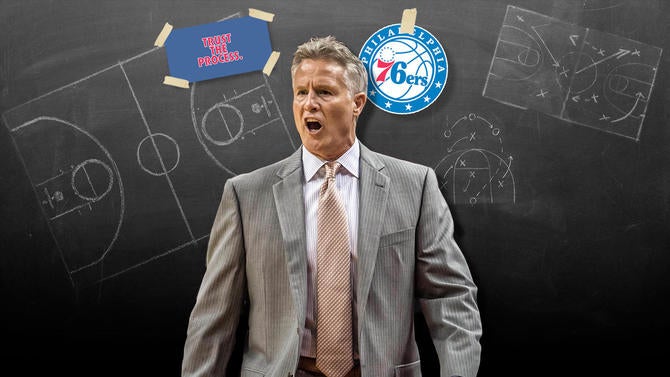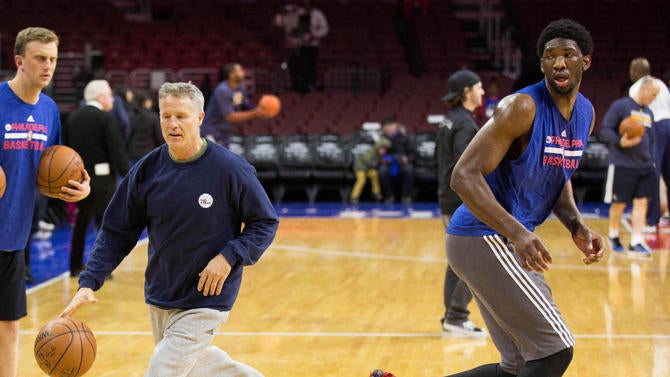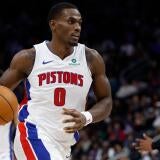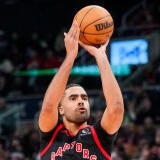
Brett Brown's process: How 76ers coach uses schoolteacher tactics with young team
The son of two schoolteachers is up to the task of helping Joel Embiid, Ben Simmons and Markelle Fultz learn the league
CAMDEN, N.J. -- Brett Brown will tell you about Scandinavian classrooms. At the Philadelphia 76ers' training complex, the coach gestures toward the room where he conducts film sessions. Its layout, he explained, is no accident.
"It's in the shape of a horseshoe so that I'm not up talking and they see the back of my head," Brown told me. "I'm looking at them. There's monitors all over. We can look at each other and talk. That is very Scandinavian. When you start studying the countries that repetitively produce the highest aptitude of students and why, that interests me."
When Brown interviewed for the job in the summer of 2013, one of its greatest attractions was the chance to have a say in the design of this 125,000-square-foot building, which sits across the Delaware River but only about 15 minutes from Wells Fargo Center. He and then-general manager Sam Hinkie sat with architects, trying to make every part of the facility reflect their vision. The son of schoolteachers, Brown is interested in "the psychological part of how we're all motivated" and casually references Maslow's hierarchy of needs, mindfulness, the growth mindset, gamification, deliberate practice and the Navy SEALs' officer selection process when talking about how he approaches teaching young players.
Brown's background -- he was the San Antonio Spurs' first director of player development -- and unrelentingly positive attitude made him an ideal leader for Philadelphia as it underwent its much-discussed rebuilding process. Four-and-a-half years ago, though, he had no idea how many hours he would spend in his office tutoring top draft picks. From Nerlens Noel to Joel Embiid, Ben Simmons to Markelle Fultz, injuries have kept at least one talented 19-to-21-year-old sidelined and seeking ways to stay engaged for essentially all of Brown's tenure.
Brown has gone over Magic Johnson film with Simmons, Stephen Curry film with Fultz and Tim Duncan film with Embiid. What he prefers, though, is to show them clips of themselves, even going back to high school and college. He asks open-ended questions -- "I don't want to be Professor Brown," he said -- and wants these sessions to be interactive and collaborative.
"Vision trumps all senses," Brown said. "If I see it, I can say it, they can know it. It eliminates boundaries. You know, cultural boundaries, border boundaries. And so I get 'em in there, I show tape of stuff. And I challenge them and say, 'What do you see? Why do you see that? What do you think? What would you have done differently?' People always enjoy seeing themselves."

The Sixers had lost seven of eight games the morning that Brown said this, and they would lose again that night against the Toronto Raptors. After a 13-9 start, they are 17-19 heading into their game Wednesday against the San Antonio Spurs.
For someone who once navigated a 1-30 start, this recent rough stretch is small potatoes. Unlike past seasons, however, there are real expectations in Philadelphia. On the way to shoot-around, my Uber driver said he was down on Simmons -- the season-long favorite for Rookie of the Year -- because of his reluctance to shoot. The driver wondered how much longer Brown would have a job.
Sitting outside his office, Brown never sounded worried about where the Sixers are. He has put more thought than you can possibly imagine into how he wants them to operate. He is confident that they haven't skipped any steps. He is sure this will pay off.
"We've been stung badly by injury, but it doesn't make us waver," Brown said. "It's not like we're just going to pivot out of a very core belief, a very sort of linear way we see the world on how we want to do things culturally. It's actually given us greater resolve."

Brown pointed up to the second level of the practice facility and said the team would have a Christmas gift exchange the next day. In that room, they have also had a number of team breakfasts. About once a month, at breakfast, a Sixer will pair up with a video coordinator and deliver a presentation -- about a non-basketball topic.
"It will be like they're in school and they have a project," Brown said. "And it's PowerPoint. It's informative. It goes for probably 20 minutes."
T.J. McConnell talked about coffee, Nik Stauskas talked about UFOs and Gerald Henderson talked about Charles Manson. Jahlil Okafor tackled the debate about whether or not college athletes should be paid. Robert Covington brought in a pet snake. The subject of Dario Saric's presentation was the Croatian War of Independence. Brown said that there were "a lot of misty eyes during that one."
Most recently, Justin Anderson spoke to the team about music. "The old school doesn't really respect the new school as much," Anderson said, arguing against the generational gap that stops some Jay-Z and Tupac fans from appreciating young artists. Anderson drew a direct parallel to his chosen profession.
"That's like not changing and growing with the game of basketball," Anderson said. "We can't hold on to the typical 4 and 5 man on each block banging and posting up -- now your 4 man has gotta be able to shoot 3s. So you can't really hold on to what was cool in your culture back then. We have to kind of grow."
"Grow" is a word you will hear frequently if you spend any time with Brown. He is fond of saying that development is the lifeblood of a program, and, in that respect, he insists that nothing has changed since Philadelphia's move from "a very humble pharmaceutical college with a single court and junior-high locker room" to this huge, shiny space. Hinkie has been replaced by Bryan Colangelo and the players now talk about making the playoffs, but Brown is still focused on how Robert Covington works on his ballhandling, finishing and passing after practice.
Brown glows when saying he is proud of Covington -- "this kid comes out of left field and then all of a sudden somebody gives him $62 million" -- and said he misses the "sweat equity stuff" that he used to do more when he didn't have an entire development staff drilling players on the court. Now, though, he gets to plan field trips.
In 2014, Brown watched Angela Duckworth's TED talk on the subject of grit -- and why some inner-city kids excel in school while others do not -- and liked it so much that he took the team to the University of Pennsylvania to listen to her speak. His favorite trip was going to Hayden Planetarium and hanging out with celebrity astrophysicist Neil DeGrasse Tyson. This year they have had guest speakers ranging from Philadelphia Eagles legend Brian Dawkins to filmmaker M. Night Shyamalan.
"You're always trying to learn from successful people," Brown said. "It's not just going to John Wooden or going to Mike Krzyzewski, it's broader than that. And it's not studying Bill Belichick. It's all that and some."

Brown is always trying to find an edge when it comes to helping his players. He likes watching them become better shooters, playmakers and defenders, of course. Beyond all of his studying and his teaching techniques, though, he said there is a simple human element to his approach: When you show people you care and you challenge them, they will respond.
"It's the thing that most connects you to the person," Brown said. "When you really feel like you can help somebody, there's a relational side, there's a trust aspect side that can grow more quickly when you're invested, when they see themselves getting better."
In Embiid, Brown has been in charge of a truly unique player development project: a 7-footer who shoots 3s, posts up and loves to Eurostep. But the Cameroon native also missed the first two seasons of his professional career and played in only 31 games in his third. Brown's biggest lesson from working with him is how difficult it is for a young person to stay motivated when there seems to be no light at the end of the tunnel.
"To think that Joel was going to come out and lift weights and eat carrots for two years is ridiculous," Brown said. "Like, you know, they're young, they have money, it's no indictment on his pride or his competitiveness. Each of my guys that have gone through these droughts of not playing, they have taught me how to do things better as a coach and recognize the human nature in the reality that they can't compete. They can't be with the team. And so how do you set things up and at times be a little bit forgiving and at times put a little bit of human touch on it where you understand? There's no book that tells you how to do that."
In dealing with injury setbacks and losing, Brown has earned praise for the culture he has created. He is wary of that word, though, because it is murky. "Trust The Process" may have become a rallying cry for Sixers fans, but Brown does not have any pet phrases written all over the gym. He cares more about who is sitting next to each other in the locker room, saying that all those little details are preordained, planned and purposeful -- and they add up.
"It's how you act; culture is behavior," Brown said. "Everybody wants to talk about 'culture.' It's hard to quantify it. For me, if you made me say a single word, it's behavior."
On the outside, there is still some question as to whether or not Brown will prove to be the right leader when Embiid and Simmons are ready to compete for championships. After Okafor was traded to the Brooklyn Nets, the big man told reporters that he was "happy I'm here with an actual NBA coaching staff." Brown dismissed the comment and told reporters that "everybody understands how we treat people here, and the attention he received while he was here." He prides himself on the relationships he has built, feels strongly about the direction of the team and believes Philadelphia has yet to scratch the surface of what it can be.
In the middle of our interview, Anderson interrupted to ask Brown if he could put on some music. Shoot-around had been over for a while, but he was on the court trying to rehabilitate a shin injury.
"Absolutely," Brown said, then turned to me and asked for "something modern that he'd be surprised that I know." I suggested Lil Peep, an emo rapper who tragically died of an overdose at the age of 21 in November.
"Hey J.A., do you have any Lil Peep?" Brown said.
Anderson cracked up. A giant grin lit up Brown's face.
"That's the thing I love the most," he said. "I love interacting with the team and having fun with the team and keeping it real and light. It goes heavy, it goes light. Stringing the plots with all this, we've navigated 1-30 starts here. The bloodline, the lifeline also of holding this thing together is borne out of the underbelly of how we interact with people and teach people and develop people and hold them accountable. Everybody wants law and order. Everybody wants to be told the truth. They want discipline. Down deep, they want it and they want it bad. And so we walk that side of it as best we can, as much as we can."


















